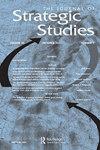The ‘Petrocurrency’ Determinants in Growing Sino-US Confrontation: Implication for South Asia
IF 2
2区 社会学
Q2 INTERNATIONAL RELATIONS
引用次数: 0
Abstract
The purpose of this article is to identify the areas where China’s internationally rising monetary and petrocurrency influence is likely to conflict with the US’s monetary as well as strategic interests. It is assumed that China’s creation of mutually financially supportive networks of economic, monetary, petrocurrency as well as highly innovative and expanding defence industrial structures are sources of generation and reinvestment of revenues and surpluses which are directly coming in conflict with the US’s international interests and especially in the South Asian region. In this perspective, this article poses the questions: what are the innovative developments in China’s refinement of its petrocurrency and its internationally extended arms industry? How are these leading to confrontation with the US? And lastly what are the impacts of this monetary and petrocurrency policies on the South Asian region? In the theoretical domain, this article addresses the role of the combination of monetary and strategic factors in growing confrontation between the two great powers and the possibilities of conflicts leading to changes in international polarity and order. It is argued that China appears to suggest that its new version of international order encourages economic competition among great powers; however, this newly emerging Chinese global monetary and geostrategic network has equal risks of leading to strategic confrontations and armed conflict between China and the US as well as South Asian states.日益加剧的中美对抗中的“石油货币”决定因素:对南亚的影响
本文的目的是确定中国在国际上不断上升的货币和石油货币影响力可能与美国的货币和战略利益发生冲突的领域。人们认为,中国建立的相互支持的经济、货币、石油货币网络,以及高度创新和不断扩大的国防工业结构,是收入和盈余的产生和再投资的来源,这些收入和盈余直接与美国的国际利益发生冲突,特别是在南亚地区。从这个角度来看,本文提出了以下问题:中国石油货币的细化和国际扩张的武器工业的创新发展是什么?这些是如何导致与美国对抗的?最后,这种货币和石油货币政策对南亚地区有什么影响?在理论领域,本文探讨了货币和战略因素的结合在两个大国日益加剧的对抗中的作用,以及冲突导致国际两极和秩序变化的可能性。有人认为,中国似乎在暗示,其新版国际秩序鼓励大国之间的经济竞争;然而,这个新兴的中国全球货币和地缘战略网络同样有导致中国与美国以及南亚国家之间战略对抗和武装冲突的风险。
本文章由计算机程序翻译,如有差异,请以英文原文为准。
求助全文
约1分钟内获得全文
求助全文
来源期刊

Journal of Strategic Studies
Multiple-
CiteScore
4.00
自引率
5.30%
发文量
40
期刊介绍:
The defining feature of The Journal of Strategic Studies is its commitment to multi-disciplinary approach. The editors welcome articles that challenge our historical understanding of man"s efforts to achieve political ends through the application of military and diplomatic means; articles on contemporary security and theoretical controversies of enduring value; and of course articles that explicitly combine the historical and theoretical approaches to the study of modern warfare, defence policy and modern strategy. In addition to a well-established review section, The Journal of Strategic Studies offers its diverse readership a wide range of "special issues" and "special sections".
 求助内容:
求助内容: 应助结果提醒方式:
应助结果提醒方式:


